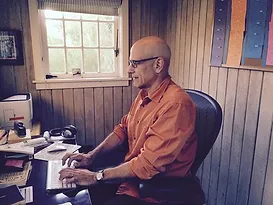Until I was baptized, I don’t think I was a Jew.
Andrew Klaven
 Andrew Klaven is an award-winning screenplay writer, suspense writer and media commentator. But what is really gripping is his own story (which you can read or briefly watch). How does a 50 year-old agnostic Jew from San Diego suddenly find himself being baptized at The Church of the Incarnation in Manhattan? That, Klaven would tell you, is the majesty and mystery of the living Messiah, who still calls people to deny themselves, take up their cross, and follow Him. “My father was always afraid that if I became a Christian,” he reflected, “I would reject Judaism. But weirdly, I never felt connected to my Judaism until I became a Christian.” When one meets the living God, nothing is ever the same.
Andrew Klaven is an award-winning screenplay writer, suspense writer and media commentator. But what is really gripping is his own story (which you can read or briefly watch). How does a 50 year-old agnostic Jew from San Diego suddenly find himself being baptized at The Church of the Incarnation in Manhattan? That, Klaven would tell you, is the majesty and mystery of the living Messiah, who still calls people to deny themselves, take up their cross, and follow Him. “My father was always afraid that if I became a Christian,” he reflected, “I would reject Judaism. But weirdly, I never felt connected to my Judaism until I became a Christian.” When one meets the living God, nothing is ever the same.
As we go through this series, The Jordan River Rules, I am gleaning bits and nuggets of a story that I thought I knew, but – thank you, Holy Spirit – I’m still learning new things. Nuances. Nuggets of gold.
Here’s new one.
In Joshua 2, Joshua secretly assigns two trusted men for a task that had no guarantee of success. Actually, I don’t know he did it given the last time such a reconnoiter was done, the effect was less than satisfying. Added to that, these men were not highly trained tactical observers – I’m not calling them duffs, but I know they weren’t Navy SEALs. Case-in-point: the first place they go to is a house of ill-repute, and everyone saw them! You’ll have to listen to Rick’s message to get the play-by-play, but I just say it to mention that they were not stealthy!
We don’t know all the details, just enough to know that a deal was made: she would not give them up, and they would make sure she wouldn’t perish. Listen to what she said:
I know that the LORD has given this land to you and that a great fear of you has fallen on us, so that all who live in this country are melting in fear because of you.
Joshua 2:9
 Now, the keen amongst you will notice that she mentioned “the LORD” – the Covenant name He told Moses. By the way, this “all caps” spelling is the respectful way Bible translators treat the Covenant name of God: יְהוָ֛ה or Yahweh (At least, that’s our best guess. Some have taken the vowels of Adonia [“Lord”], and the phonetic consonants JHVH – there were no vowel pointings, originally – and made “JeHoVaH.” The irony of this confusion is that as a result of the Jews being so respectful of God’s Name – so much so that they that they don’t even pronounce it, but used Adonia, is that over time they forgot how to pronounce it. Woops.) This is important because she didn’t say “your god” or even “your god Yahweh”; she had come to a belief and respect for Him, even fearing or respecting his name by invoking it. More importantly, she had come to believe judgement was upon her city and land. So, similar to how the Israelites had evaded death by posting the blood of the lamb on the doorways of their house, she marked her household with a scarlet rope, so that judgement would passover her.
Now, the keen amongst you will notice that she mentioned “the LORD” – the Covenant name He told Moses. By the way, this “all caps” spelling is the respectful way Bible translators treat the Covenant name of God: יְהוָ֛ה or Yahweh (At least, that’s our best guess. Some have taken the vowels of Adonia [“Lord”], and the phonetic consonants JHVH – there were no vowel pointings, originally – and made “JeHoVaH.” The irony of this confusion is that as a result of the Jews being so respectful of God’s Name – so much so that they that they don’t even pronounce it, but used Adonia, is that over time they forgot how to pronounce it. Woops.) This is important because she didn’t say “your god” or even “your god Yahweh”; she had come to a belief and respect for Him, even fearing or respecting his name by invoking it. More importantly, she had come to believe judgement was upon her city and land. So, similar to how the Israelites had evaded death by posting the blood of the lamb on the doorways of their house, she marked her household with a scarlet rope, so that judgement would passover her.
The response of the two spies was remarkable: “Our lives for your lives!” (Josh 2:14)
This is a remarkable thing to say because it is a shadow of what was yet to come – the reason for why God was doing this whole Promised Land bit in the first place. As Rick pointed out, and is covered in Morgan’s book, Rahab the Jerichan prostitute, would later become Rahab the righteous woman of great virtue. You see, she would become part of the Israelite community, marry a man named Salmon and together have a son named Boaz, who would famously marry a Moabite convert named Ruth (yes, that Ruth – the book of the Bible), and of course, their grandson would be David, as in King David … the distant DNA provider for another Joshua … except we call him Jesus.
You might consider this stretching it (but I don’t think so): If there was no secret mission, there wouldn’t have been Rahab; and if there was no Rahab, there would be no David; and of course, if there were no David, there would have been no Jesus. “Now, wait a minute, Sean, Jesus would still be born – God would make a way!”
I don’t know. Maybe not. God still uses the faith of people to accomplish his will. How did he know that would happen? I don’t know. That’s not my business.
Here’s what I DO know: “Faith without works is dead.” I believe there are things that must be done because, by faith, you and I get it done. If we don’t – it doesn’t happen.
Why does God hate disobedience so much? Why does it grieve him when we shrink back and don’t act in faith? It’s not just what you think or believe that matters – it’s what you do. It baffles me and frightens me. I wonder if the larger pieces of what God is doing in HIStory and what he has in store are just too big for us to see? The electron of a hydrogen atom compared to Red Giant star is almost comical to place side-by side. What if my life, and my actions by faith are simply that one atom compared to the gargantuan purpose God is building? It’s not that one isn’t as important as the other, but one makes the other possible. Can you believe there are bigger – much bigger and much more glorious – things at stake? Can you believe that your life, the sum of your obedient faith, is a small but critical part of it?
“It's true that the unexamined life is not worth living,” Klaven wrote, “but the unlived life is not worth examining.” That’s haunting. It is frightening to think that a life vainly lived – even religiously, so – is considered contemptible to God. What’s the point of making money, living a moral life, sending your kids to good schools, and having even morally good hobbies … if we totally miss a life guided by faith? I’m not saying those are bad things … I’m say that baptizing selfish pursuits in religious garb is a dangerous and even arrogant existence. Paul would say in Galatians that religious expression means nothing; “The only thing that counts is faith expressing itself through love.” Love displayed through obedience.
Klaven, and his fore-mother, Rahab, made the wise choice: to reject the pattern of this world and embrace Messiah’s plan. Let’s do the same, carefully, thoughtfully, but expediently.
